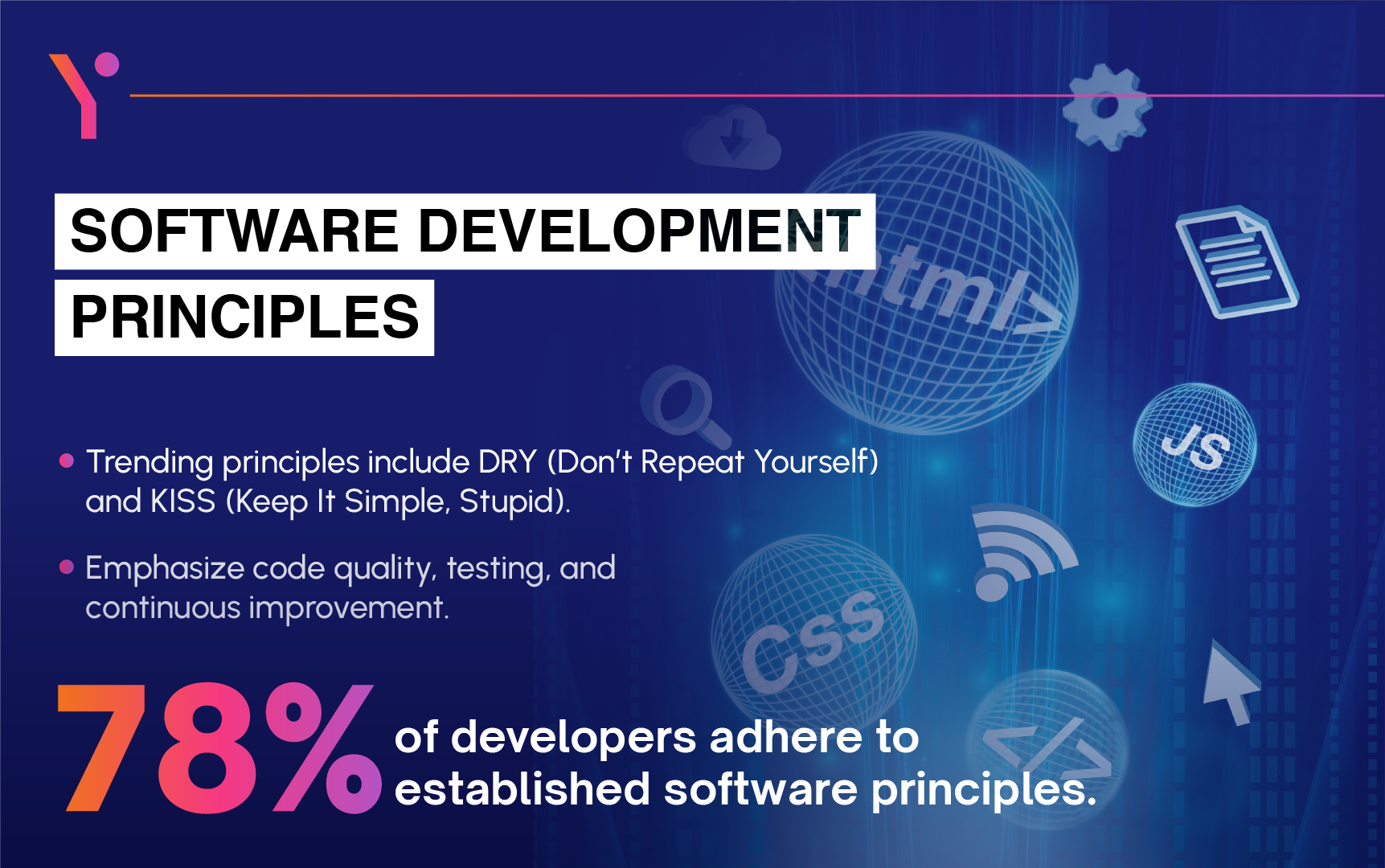The making of successful software demands a robust foundation. This is where this guide comes to your rescue as it explores key software development principles such as prioritising communication, embracing Agile development, and understanding user needs. It delves into the creation of quality software via TDD and CI/CD practices.
The technological landscape all around us is changing by the second. This either directly or indirectly highlights the notion that crafting successful software projects demands a robust foundation of software development principles.
It is these principles that guide the development process and ensure the making of maintainable, high-quality, and user-centric software. In other words, by adhering to these principles, any development team will be able to navigate the complexities of software creation and will make projects that meet the exact requirements of specific users.
Before moving on, if you want to know any point discussed here in greater detail, then contact FuturByte. They are a custom software development company that is fully capable of guiding you on the matter.
| Principal | Benefit |
Version control | Improved collaboration, easier bug fixing |
Clear requirements | Reduced work, improved project focus |
Regular testing | Early detection of bugs, improved software quality |
Modular design | Increased maintainability, reusability of code |
Continuous integration | Faster feedback loop, decreased risk of integration issues |
Foundational Principles for Success
It is pertinent to state that creating a successful project begins with a robust foundation. Let’s go through three highly important principles that will set the stage for an excellent development experience:
Customer Focus: Noting Down User Needs
A thorough understanding of the customers and their needs lies at the core of any successful software project. Software development principles greatly emphasise prioritising the user experience by:
Recognising Pain Points and Value Creation
It is paramount to understand the user’s challenges and frustrations. This is why it is important for the software to address these pain points and present value by either improving existing processes or solving the problems.
Prioritisation and User Research
Each user carries a different weight. This is why software development principles and methodologies dictate the significance of user research. This is done to identify priority functionalities and features. Techniques such as usability testing, surveys, and interviews offer invaluable insights that guide development decisions.
This is why it is important to study software development principles with examples.
The Agile Development Process: Acknowledging Change and Iteration
The time of rigid, waterfall-style development is now behind us. Today, modern software development principles openly embrace the Agile methodology that appreciates a flexible project management approach. This approach puts emphasis on:
Short Sprints
Larger and/or complex projects are divided into time-boxed, smaller sprints. Every sprint emphasises delivering a host of functionalities. This makes way for quicker iteration and feedback.
Need more information regarding short sprints? Contact FuturByte. They are a dependable CRM software development company that will give you great informational aid.
Continuous Improvement and Feedback Loops
Software development principles and practices openly promote ongoing communication across the development cycle. The feedback coming from both stakeholders and users makes way for adjustments to be done throughout the sprint. This ensures that the end product is able to align with the changing needs.
Are you interested in making the most out of the feedback? Call FuturByte. They are a dependable ERP software development services provider that deserves your attention.
Successful Collaboration and Communication
Truly, software development is considered to be a collaborative effort. This is why strong communication is vital for a team’s success, as stated by today’s leading software development principles and best practices. When we talk about effective communication, it includes:
Shared Understanding and Transparency
Every team member should have a thorough and precise understanding of the project timelines, goals, and individual responsibilities. The maintenance of transparency will harness collaboration and trust.
Are you having difficulties in maintaining transparency? Contact FuturByte. They are a renowned finance software development company that will give you valuable advice based on your case. This is why they are respected in leading industries such as finance, retail, and others.

Documentation and Regular Communication Channels
The creation of designated communication channels, such as project management tools or stand-up meetings, will facilitate regular informational exchange. A thorough documentation will ensure that everyone is on the same page, regardless of their project-related role.
To learn more about how documentation can assist you – contact FuturByte. They are a real estate software development company that enjoys good repute in leading industries, such as real estate, IT, and finance, and they will give you excellent information with regard to documentation.
Making Top-Quality Software
So far, we have laid a robust foundation. Now, it is time to get deep into the principles that ensure that the software is made with quality in mind:
Design for Scalability and Maintainability
Experts are of the opinion that top-quality software is not only about functionality. It should also be adaptable and maintainable for upcoming needs. Software development principles put emphasis on the following:
SOLID Principles and Modular Design
When we talk about Software development principles SOLID, this means Single Responsibility Principle, Open-Closed Principle, Liskov Substitution Principle, Interface Segregation Principle, and the Dependency Inversion Principle. All of these promote modularity, where the code is divided into miniature, independent units. This allows them to be easier to modify, maintain, and understand.
Another very important principle is the Software development principles DRY (Don’t Repeat Yourself). Try to check its details on your own.
Future-Proofing for Change and Growth: Software development principles and practices
It is highly important to encourage planning for possible future changes. This includes the anticipation of changing business needs, user growth, and technological advancements. A properly designed software architecture will facilitate effortless integration and scaling of new features. This is important on various levels.
Do you believe you lack knowledge regarding future proofing? Contact FuturByte today. They are a globally recognised custom software development services company that will give you excellent information on the topic.
Continuous Integration and Delivery (CI/CD)
Experts are of the opinion that CI/CD are a set of practices that streamline the development process. This is how it will align with the software development principles:
Streamlining Development with Automation
CI/CD is known to automate vital processes such as code building, testing, and deployment. This will decrease manual errors and will let developers emphasise vital coding tasks. Furthermore, software development principles and best practices focus on automation’s value in enhancing development efficiency.
Need to know more about CI/CD and how it can benefit you? Contact FuturByte. They are developers of custom software in Dubai, and their advice will benefit you both in the short and long run.
Enhanced Quality and Quicker Delivery
CI/CD makes way for reliable and frequent software releases. This permits both quicker identification of possible issues and early feedback, ultimately leading to a top-quality software product. This product will surely be unique in its own regard.
Test-Driven Development (TDD)
TDD comes as a reputed development methodology that puts emphasis on writing tests prior to writing code. It aligns with a host of important software development principles:
Early Error Detection: Writing Test Before Code
TDD makes developers ponder about the desired functionality upfront and write tests that define the anticipated behaviour. Thanks to this proactiveness, it is easy to take note of potential errors at the development stage. This will cause the creation of a more reliable and robust software product.
Code Reliability and Quality Assurance
TDD aids in maintaining high code quality by continuously testing code across the development cycle. The result here will be a reduction in regression risk (bugs coming in future changes) and a harnessing of confidence in the general software-related stability.
More Considerations for Project Success
Let’s look at the core principles. There are a host of additional practices that prominently contribute to successful software development projects. Here is further information on the matter:
Change Management and Version Control
The effective management of changes is vital across software development. A robust change management and version control systems make way for:
Maintaining Code History and Tracking Changes
Reputed version control systems such as Git let developers track changes made to the codebase. This will support reverting to the prior versions if required and aid in the clear maintenance of the software’s evolution-related history.
Rollback and Conflict Resolution Strategies
The change management process guarantees a smooth collaboration. Besides this, it states clear procedures for conflict resolution when a host of developers are performing their duties on the same codebase. This will bring down the error-related risks, thereby making way for a stable development environment.
Resource Management and Cost Efficiency
Making the software within a specific budget and within the deadline is vital for the project’s success. Here, software development principles give value to the importance of the following:
Optimising Workflows and Prioritising Tasks
When project goals are clearly defined and by prioritising tasks, developers will be able to emphasise the most important features first.
Are you having trouble properly identifying project goals? Call FuturByte. They are a business management software solutions provider that will give you helpful advice, depending on your unique case.
Selecting the Best Possible Tools and Technologies
It is absolutely essential to go with the right tools and technologies for the project. This will ensure that the developers are able to do effective and efficient work across the project’s lifecycle.

Concluding Remarks
The creation of successful software projects is commonly an ongoing process. If you follow the key software development principles mentioned here, you will be able to establish a sustainable and robust development process. Of course, this process will harness:
- The Importance of Continuous Learning and Adaptability
- Creating a Culture of Innovation and Quality
Lastly, if you believe that you need further guidance on the topic being discussed in this blog, then contact FuturByte today. They are a globally-recognised LMS software development company that will be of immense assistance to you.
Frequently Asked Questions
The following are seven software engineering principles:Separation of concernsModularityAbstractionAnticipation of changeGeneralityIncrementalityConsistencyAny person who seeks a career in IT must take proper account of these principles, as well as leading software development principles and best practices.
These are the four core principles of software engineering that every software maker should take note of:KISS (Keep it simple, stupid)DRY (Don’t repeat yourself)SOLID Principles (Single responsibility, Open-closed, Liskov substitution, Interface segregation, Dependency inversion)YAGANI (You aren’t going to need it)
These are the principles:PlanningDesignImplementationTestingDeploymentNote that a good understanding of software development principles and best practices will always give a better chance to attain the desired outcome.
The five processes are:Waterfall (sequential phases)AgileSpiralDevOpsLean
Have questions or feedback?
Get in touch with us and we‘l get back to you and help as soon as we can!







